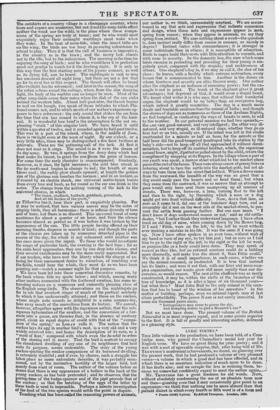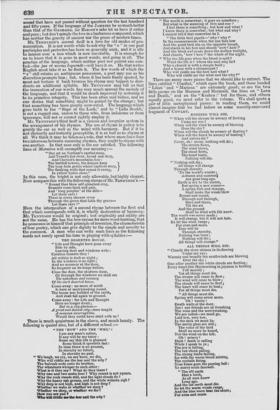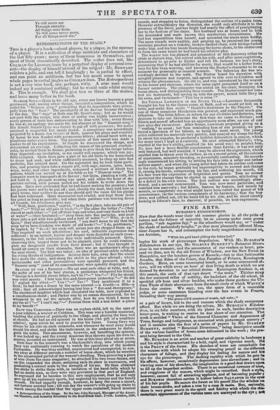LYRIC POETRY.*
This little volume is the production, we have been told, of a Cam- bridge man, who gained the Chancellor's medal last year for English verse. We have no great liking for prize poetry ; and it was with a sort of agreeable surprise, that, after being told of Mr. TENNYSON'S academical achievements, we found, on glancing over the present work, that he had produced a volume of very pleasant verses—a volume in which a good deal has been effected, and in which there is no uncertain indication of much more to be done. It has faults also; and we scruple the less in noticing them, be- cause we somewhat confidently expect to meet the author Mr. TENNYSON has a great fondness for old words. Now, without absolutely condemning the use of an obsolete term now and then—granting even that it may occasionally give point to an expression—we think that nothing can be more absurd than that piebald dialect in which every fourth or fifth word is of a form and
* Poem. chiefly Lyrical. ByAlfzed Tennyeon. Lon4414 1830.
sound that have not passed without question for the last hundred and fifty years. If the language of the JAMESES be so much better than that of the GEORGES, for Heaven's sake let us have it entire and pure; but don't mingle the two in a barbarous compound, which has neither the gravity of ancient nor the grace of modern times. Mr. TENNYSON'S second fault is a love for old modes of pro- nunciation. It is not worth while to ask why the " e " in our past participles and preterites has been so generally sunk, and it is idle to lament over a loss which is now inevitable. It is enough for us to know that it is gone in most words, and going in all. The practice of the language, which neither poet nor prosist can con- trol—the jus et norma loquendi—will have it so. He that writes English must take it as he finds it. The few words of which the "e" still retains an ambiguous possession, a poet may use as his discretion prompts him; but, where it has been finally ejected, he must not torture it back because his rhyme may happen to desi- derate an additional syllable. Mr. TENNYSON may tell us that the truncation of our words has very much marred the melody of the language, and that it would be much improved by restoring it to its primitive integrity. This has been often said before, and no one denies that something might be gained by the change ; but that something has been greatly over-rated. The language which save birth to the "Rape of the Lock," and to " Lalla Rookh,' is not a rugged one, unless to those who, from indolence or from ignorance, will not or cannot rightly employ it. Mr. TENNYSON'S third fault is a vicious and irregular system in the arrangement of his rhymes. The use of rhyme in poetry is to gratify the ear as well as the mind with harmony. But if it be not distinctly and instantly perceptible, it is as bad as no rhyme at all. We think it may be taken as a rule, that where more lines than two intervene between recurring rhymes, they ought to rhyme with one another. In that case only is the ear satisfied. The following lines of Marmion will exemplify our meaning :— "Day set on Norham's castled steep,
And Tweed's fair river, broad and deep, And Cheviot's mountains lone: The battled towers, the donjon keep The loop .hole grates where captives weep, The flanking walls that round it sweep, In yellow lustre shone."
In this case, the triplet is not only allowable, but highly elegant. Now compare this with the following stanza of Mr. TENNYSON'S:— " Round thee blow self-pleached deep,
Bramble roses faint and pale,
And long purples' of the dale—
Let them rave I These in every shower creep
Through the green that folds thy grave—
Let them rave !"
Here the interposition of a second rhyme between the first and that which corresponds with it, is wholly destructive of harmony. Mr. TENNYSON would be original ; but originality and oddity are not the same. He has the less excuse for mere word-hunting, that he possesses in himself that principle of invention, the characteristic of true poetry, which can give dignity to the simple and novelty to the common. A man who can write such lines as the following needs not surely spend his time in playing with syllables THE DESERTED HOUSE.
" Life and Thought have gone away Side by side, Leaving door and windows wide : Careless tenants they !
All within is dark as night.; In the windows is no light ; And no murmur at the door, So frequent on its hinge before.
Close the door, the shutters close,
Or through the windows we shall see
The nakedness and vacancy Of the dark deserted house.
Come away : no more of mirth
Is here or merrymaking sound. The house was builded of the earth, . And shall fall again to ground.
Come away : for Life and Thought Here no longer dwell ;
But in a city glorious—
it great and distant city—have bought A mansion incorruptible.
Would they could have staid with us !
There is much quaintness in the above, and much beauty. The -following is quaint also, but of a different school :— "THE 'HOW' AND THE WHY.' 2
I am any man's suitor, If any will be my tutor : Some say this life is pleasant Some think it speedeth fast: In time there is no present, In eternity no future, In eternity no past. " We laugh, we cry, we are born, we die, Who will riddle me the how and the why ? The bulrush nods unto its brother, The wheatears whisper to each other :
What is it they say? 'What dd they there? Why two and two make four ? Why round is not square.
Why the rock stands still, and the light clouds fly ? Why the heavy oak groans, and the white willows sigh? 'Why deep is not high, and high is not deep ? Whether we wake or whether we sleep ?
Whether we sleep, or whether we die ?
How you are you ?
Who will riddle me the how and the why ? " The world is somewhat; it goes on somehow ;
But what is the meaning of then and now ? I feel there is something; but how and what ?
. I know there is somewhat; but what and why?
I cannot tell if that somewhat be I.
" The little bird pipeth—' why ? why ?' In the summerwoods when the sun falls low And the great bird sits on the opposite bough, And stares in his face and shouts how? how ?'
And the black owl scuds down the mellow twilight, And chants, how ? how ?' the whole of the night.
" Why the life goes when the blood is spilt? What the life is ? where the soul may lie? Whv a church is with a steeple built ; And a house with a chimneypot ? Who will riddle me the how and what?
Who will riddle me the what and the why ?"
There are many more pieces that we should like to extract. The lines entitled " Claribel," which open the book, and those headed " Lilian " and " Mariana " are extremely good; so are the two little poems on the Merman and Mermaid, the lines on " Love and Death," and on the " Kraken :" but for these, and others equally good, we must refer to the volume. We shall quote a pair of little metaphysical pieces : in reading them, we could almost imagine that we had before us some recently-recovered fragment of COWLEY. NOTHING WILL DIE.
" When will the stream be aweary of flowing Under my eye ? When will the wind be aweary of blowing Over the sky ? • When will the clouds be aweary of fleeting ?
When will the heart be aweary of beating ? - And nature die ?
Never, oh ! never, nothing will die; The stream flows, The wind blows, The cloud fleets, The heart beats, Nothing will die.
"Nothing will die; All things will change Through eternity. 'Tis the world's winter; Autumn and summer; Are gone long ago. Earth is dry to the centre,
But spring a new corner—
A spring rich and strange, Shall make the winds blow Round and round, Through and through, Here and there, Till the air And the ground Shall be filled with Iife anew.
The world was never made ; It will change, but it will not fade. So let the wind range ; For even and morn Ever will be Through eternity.
Nothing was born ; Nothing will die ; All things will change."
ALL THINGS WILL DIE.
" Clearly the river chimes in its flowing Under my eye; Warmly and broadly the southwinds are blowing Over the sky ; One after another the white clouds are fleeting; Every heart this Maymorning in joyance is beating Full merrily ; Yet all things must die.
The stream will cease to flow; The wind will cease to blow; The clouds will cease to fleet; The heart will cease to beat; For all things must die.
"All things must die.
Sprino•° will come never more.
Oh ! vanity ! Death waits at the door.
See I our friends are all forsaking
The wine and the merrymaking.
We are called—we must go. Laid low, very low, In the dark we must lie.
The merry glees are still; The voice of the bird Shall no more be heard, Nor the wind on the hill.
Oh ! misery ! Hark ! death is calling While I speak to ye ; The jaw is falling, The red cheek paling, The strong limbs failing, Ice with the warm mixing, The eyeballs fixing.
Nine times goes the passing bell :
Ye merry souls farewell.
" The old earth Had a birth, As all men know
And thon g ago. e old earth must die. So let the warm wiads range, And the blue wave beat the shore;
For even and morn Ye will never see Through eternity. All things were born.
Ye will come never more, For all things must die."




























 Previous page
Previous page